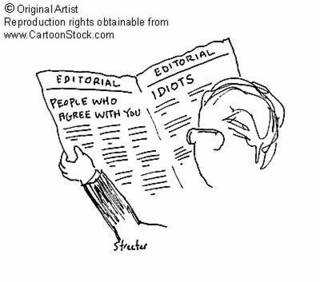
Newspapers are supposed to be in neutral position. But they do not only deal with facts, they present opinions. Sometimes the opinion is hidden between the facts which make it difficult to tell what position they take. We do not read all the newspapers after all. Still more difficult is to identify the value of the society or culture behind the newspaper. To achieve this end, one will not only deal with all the stuff in the newspaper, but also know what important thing is not said in the newspaper.
Every morning, I read The Straight Times, a newspaper widely read in Singapore, and I do not feel anything special about the papers until one day a girl who is in a special education program in NUS, told me some hint. She said that what the Straight Times reports will let you feel that the world is full of danger and uncertainty, but our little island is safe, warm. I think about it, she is probably right. I read from the newspaper that how Chinese government are facing difficulty in steering the economy, how Japan suffers from a recent earthquakes and so on. However, I seldom come across an article that questions the current government and challenge their leaders with hard questions. What I heard is all praise for their great leaders, for how they lead them to the current thrive of S¡ngapore. This is interesting topic of political science. And also recently, an optional reading for my philosophy class is on the political lies, how many kinds of political lies and what function does each achieve. It appears interesting, but unfortunately, I have not done my reading yet. This again relates to something still deeper. It is the values of the society. I look for the definition of values on the web, and find the following stuff on wickipedia. Quite interesting. And I will not be able to write about it today.
Personal and cultural values
Each individual has a set of beliefs and ideas about general concepts that are called values. They describe how much value a person places on various ideas, objects, or beliefs. Societies have values that are shared between many of the participants in that culture.
These values can be grouped into four categories:
Ethics (good, bad, moral, immoral, amoral, right, wrong, permissible, impermissible)
Aesthetics (beautiful, ugly, unbalanced, pleasing)
Doctrine (political, ideological, religious or social beliefs and values)
Inborn (inborn values such as reproduction and survival, a controversial issue)

No comments:
Post a Comment